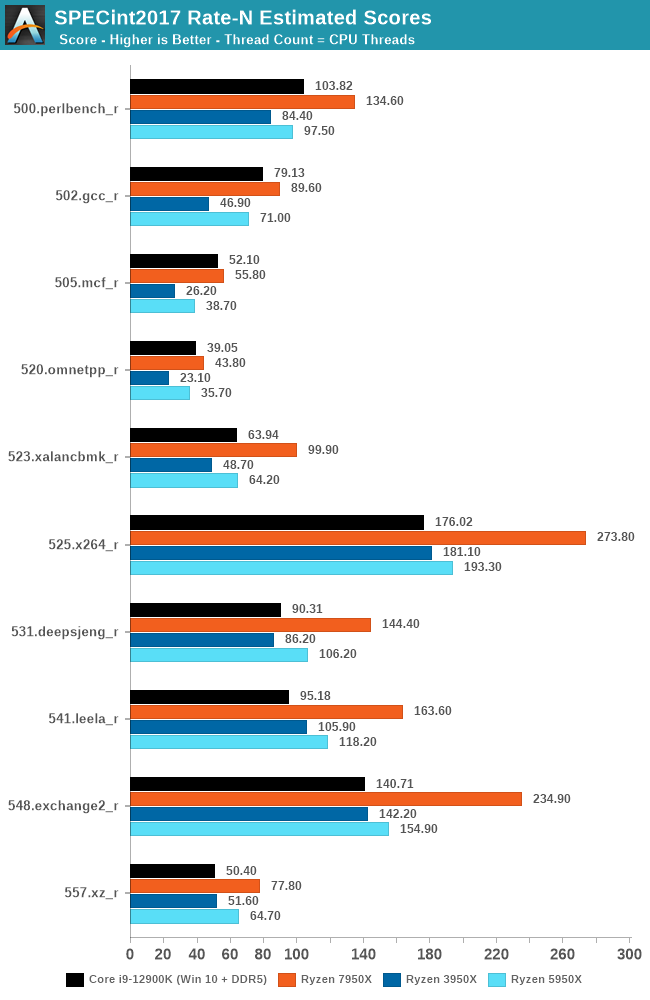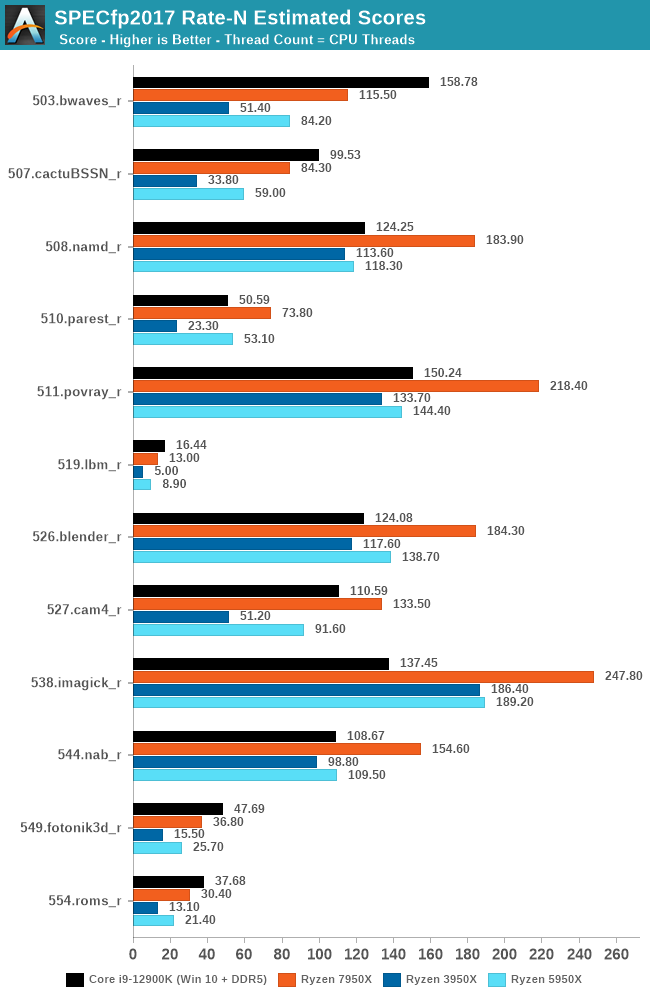AMD Zen 4 Ryzen 9 7950X and Ryzen 5 7600X Review: Retaking The High-End
by Ryan Smith & Gavin Bonshor on September 26, 2022 9:00 AM ESTSPEC2017 Multi-Threaded Results
Although single-threaded performance is important and Zen 4 has a clear advantage here, multi-threaded performance is also very important. Some variables to consider when evaluating multi-threaded performance is that desktop processor designs typically boost a single core higher, with the rest lagging in frequency behind to either stay under the thermal (TJMax) or power (TDP) envelopes. Some manufacturing processes are more efficient by design due to extensive R+D and product management, with Zen 4 looking to be much more in terms of perf per watt over Intel's Alder Lake architecture.
In the instance of the AMD Ryzen 9 7950X, it has a clear advantage over its predecessors in that it not only has a higher single core boost (5.7 GHz versus 4.9 GHz), but it also has a higher TDP than the Ryzen 9 5950X (170 W versus 105 W. This increase in TDP not only allows for a higher frequency, but it allows for a higher frequency spread across all of the cores when under full load.

Opening up our look at our SPECint2017 NT results, and we see a similar uplift in performance gains as we did in the single-threaded tests. In tests such as 500.perlbench_r, the Ryzen 9 7950 is 38% ahead of AMD's previous generation Ryzen 9 5950X, which is impressive. In 523_.xalanbmk_r, the Ryzen 9 7950 is 55% ahead of the Ryzen 9 5950X, and over 100% better in performance over the Zen 2-based Ryzen 9 3950X.

In our SPECfp2017 NT testing, certain workloads such as in 538.imagick_r showed massive increases in performance over previous generations, with a 30% uplift in performance over Zen 3. The difference here between Zen 3 and Zen 2 was marginal (10%), but Zen 4 is a more efficient core architectural design, with many improvements across the board playing a hand here; the switch to DDR5 versus DDR4, more cache per core, higher frequency, higher TDP, etc.
Overall AMD's Zen 4 architectural differences and improvements show that not only does AMD have the crown for single-threaded performance, but it's also ahead in multi-threaded performance too, at least from our SPEC2017 testing. As always when Intel or AMD makes a claim on IPC performance increases, AMD seems to be about right with claims of around 29% in ST performance and even more so in MT performance.










205 Comments
View All Comments
Silver5urfer - Tuesday, September 27, 2022 - link
Intel won't sell new mobos. They already have Z690 saturation. Barely anyone will get Z790. AMD on the other hand will continue to sell new boards, the quarter is not based on the Client only. It will include the HPC. Intel lost money there, and AMD won't be losing because Genoa is on track and SPR XEON is delayed.AMD AM5 is not just hey this thing is fast and just for gaming. It will be a socket that is going to last until Intel Nova Lake launches that is next 2 Intel sockets. That is a huge advantage for a small price for paying customers now.
Also why is everyone chanting same BS that GN Steve did with AMD boards are too expensive, did you see how Z690 was at when it launched same thing it was expensive ? And DDR4 boards are worse quality and features than the premium cut DDR5. Then Intel launched B660 and AMD's B650/E is also coming. So nope that BS argument about Mobo pricing is too much thrown around. Once the B650 launches by that time 13th gen will hit Retail market and new GPUs as well. And it's November season and in America the Black Friday sales will kick in and see price cut for all products we are seeing now.
So ultimately AMD is not going to lose money.
The biggest BS from a smart customer pov is with Intel LGA1700 EOL and the whole socket bending crap, it's like AM4's unreliable IMC and poor IODie with it's issues. AM5 needs to prove itself but given how they removed the IF from memory clocks I can bet it won't have the issues from AM4.
X3D is a niche market it won't be chart topper for sales at-least if it's again 7800X3D single SKU. Same for KS bin. It depends on how AMD will execute, idk why every single AMD fan says X3D is going to do something if AMD can clock it this high and also allow tuning then it will be a true gen refresh to compete vs Meteor Lake else it will be just a Gaming Juggernaut. Reply
nandnandnand - Tuesday, September 27, 2022 - link
@Silver5urfer rumored to be 3 SKUs, including a 7900X3D, and +30% average performance instead of 15%. I guess that would be a result of improved latency, bandwidth, no voltage/clock decreases, etc. ReplySilver5urfer - Wednesday, September 28, 2022 - link
A 7950X3D means it will have extreme high heat because not only single cache stack you are adding 2 stacks atop the CCDs, how will AMD able to remove that ? Unless the way Cowos TSMC Stacking is technically changed OR they have to lap out the IHS internally to reduce the thickness and compensate the high heat transfer. The current IHS is thick due to many reasons one can assume - The LGA1718 stability, Chiplet integrity with high heat and pressure of HS and cooler compat and it causes the heat density increase, which is why 95C.I really think a 7800X3D is the only way for AMD even though rumors mention 3SKUs because a total SKU refresh totally cannibalize the entire 7000 lineup, because a 7600X is to get best gaming out of AM5 with cheaper option almost at more than 1/2 the price reduction vs a top end R9. And R7 7900X is basically an all rounder like 5900X best for gaming and production now you add the Cache block it would have to fight with 7900X.
Voltage reduction was done on Zen 3 because AMD shoved 1.4v through all Ryzen 5000 processors, insanely high and IODie was also on high voltage, causing all that instability add the 1.3v bin silicon, everything gets better including the heat density. Zen 4 TSMC 5N is much better because it's just 1.2v now at high clock rate. The voltage is not an issue anymore, the design of the Zen 4 itself is like this, how AMD intended to breathe fire at 95C even for 7600X is the hint. Reply
nandnandnand - Wednesday, September 28, 2022 - link
Heat was never the problem for the 5800X3D. It was only voltage, due to using an immature 3D (2.5D) chiplet technology that could not be run at the higher voltages. So I don't think the 7950X3D can't happen. If they have to drop voltages and clocks again, then hopefully the cache has improved.I think AMD should do at least a 7950X3D and 7800X3D. They can prevent cannibalization by giving it a healthy price bump. Probably +$100 to the 7950X3D, +$50 to the 7800X3D, and let the 7700X price drift lower. 7900X3D doesn't make sense, and people would love a 7600X3D but AMD would not. Reply
nandnandnand - Tuesday, September 27, 2022 - link
@Hifihedgehog OP compared 7000X3D to the 13900KS, that's what I addressed. ReplyHifihedgehog - Tuesday, September 27, 2022 - link
Wrong: the i9-13900K is less than $600. The 7950X is going to have to have its price lowered, especially with the price of DDR5 and the motherboards simply off the charts. And good too: Lisa Su needs to be running a price war and not pretend that her company has more market share. ReplyThe Von Matrices - Tuesday, September 27, 2022 - link
A price war doesn't benefit AMD when they are supply constrained by TSMC and selling every chip they can manufacture. There's a reason that AMD doesn't offer any products in the <=$100 CPU market right now and it isn't because they don't want to make money. ReplyHifihedgehog - Tuesday, September 27, 2022 - link
https://download.intel.com/newsroom/2022/2022innov... Replydwade123 - Tuesday, September 27, 2022 - link
Overheated and overpriced. Don't let those scumbags tell you that "95C is normal" because it's not. Avoid at all cost! ReplyThanny - Tuesday, September 27, 2022 - link
Running the memory at JEDEC speeds is definitely the wrong choice for a review. While it may be true that most people don't set the memory profile in the BIOS, none of those people read CPU reviews. Essentially every person who would read this reviews will be setting memory to the XMP/EXPO settings.So you're essentially invalidating your test results for the only people who see them. Reply